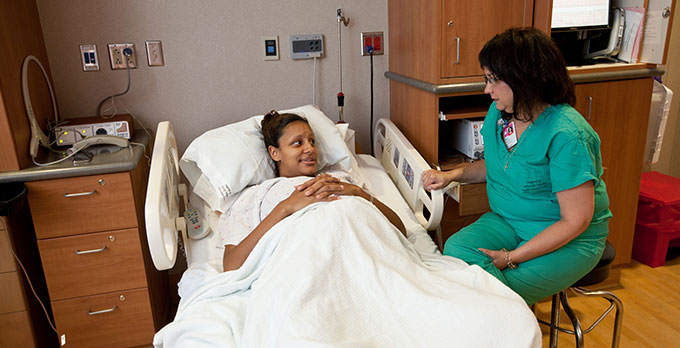If you are pregnant or thinking about starting a family, chances are you are picking out baby clothes and choosing names—and your baby’s future risk of obesity is not top of mind.
But it should be. Obesity is a serious condition that involves excessive body fat. Obesity is a physical and mental health problem that can start in early childhood and continue for a person’s whole life:
- 4% of all 2- to 5-year-olds in the U.S. are obese.
- Compared with white children, more Hispanic and black children are obese.
- Children with obesity are more likely to have high blood pressure, type 2 diabetes, breathing problems, and joint problems.
Take heart. Research shows that when pregnant women make healthy diet and exercise choices, their babies’ risk of obesity goes down. Your doctor or midwife can help you make a healthy eating and exercise plan that works for your life, starting with these five steps.
1. Maintain a Healthy Weight
A recent study in Pediatrics showed fewer infants gained excess weight when their mothers took part in a special program called the First 1,000 Days. The goal of the program was to help women gain a healthy amount of weight in pregnancy and identify problematic weight gain in their babies.
Program staff received training about obesity prevention, and providers offered pregnant patients:
- Individualized health coaching during and after pregnancy on diet, sleep, stress reduction, and exercise.
- Monitoring for excess weight gain during pregnancy.
- Screening for adverse health and social behaviors, including drug and alcohol use as well as depression and anxiety.
- Educational materials to encourage healthy behaviors.
The numbers don’t lie. Women in the study gained less extra weight during pregnancy and their infants had a 54% lower risk of being overweight at six months after delivery.
2. Quit Smoking
The tar and nicotine in cigarettes are bad for your entire body, especially your heart and lungs. The chemicals in cigarettes are absorbed by your growing baby, putting them at risk, too.
Researchers studied women who smoked during their pregnancy. They discovered that babies exposed to smoke were more likely to become overweight or obese.
3. Take Prenatal Vitamins
Prenatal vitamins are full of folate—an essential B vitamin that may protect your child from obesity—as well as many vitamins and minerals that will help the baby grow.
Researchers evaluated women’s plasma samples several days after they delivered their children. They discovered that women with the lowest levels of folate in their systems correlated with the highest risk of child obesity.
Women with obesity who took proper amounts of folate had children with a 43% lower risk of obesity compared to patients with lower folate levels.
4. Choose Healthy Foods and Drinks
Your diet during pregnancy is the primary source of energy for your growing child. Researchers studied women who ate less healthy foods such as white bread, red and processed meat, and fries. They found that children of these patients had an increased risk of being overweight by age 3.
Help your child by optimizing your diet before or during pregnancy. Eat more fruits, vegetables, whole-wheat bread, low-fat dairy, and baked chicken. Substitute water for high-sugar drinks, such as juice or soda.
5. Move it, Move it
Exercising during pregnancy reduces the risk your child will develop obesity. Moving more also can improve your own health, especially if you’re diabetic or at risk for gestational diabetes.
Aim for 30 minutes of low-impact exercise five times a week: you’re active enough to sweat but can still hold a conversation. Walking, swimming, or riding a stationary bike are all safe options for exercise during pregnancy. Talk with your doctor or midwife about the best choices for you.
Following these five steps can help reduce the risk that your child will develop obesity.
https://www.sciencedaily.com/releases/2021/07/210729143414.htm

